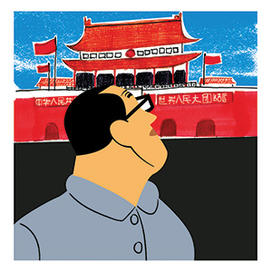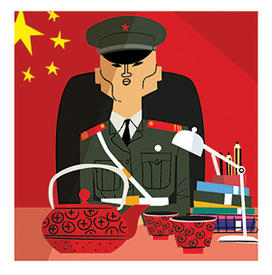In high school, a history teacher encouraged Rory Truex ’07 to study China in college. That trajectory led him to study abroad through Princeton in Beijing, then through the Princeton in Asia program, where he helped create the Summer of Service program for students to teach English in rural China.
“The Chinese government is problematic in many ways, but authoritarianism as a phenomenon is important to understand because there are so many complexities,” says Rory Truex ’07.
Now, as an assistant professor of politics and international affairs at Princeton, Truex’s research focuses on Chinese politics and how authoritarian regimes stay in power with the strategies that are employed. Since the Chinese Communist Party is among the world’s most secretive political organizations, that’s become more difficult than ever.
Much of Truex’s research focuses on the intersection of public opinion and political psychology, including what type of personalities will buy into a political power or reject it. “For some citizens, the Chinese Communist Party becomes part of their identity,” Truex says. “They internalize the regime as part of themselves.”

Isolating Traits
Before the pandemic, Truex conducted three surveys — one online with 2,024 citizens, a national face-to-face survey of 3,573 citizens in urban China, and a sample survey of 1,986 university students. He found the “average discontented citizen” in China is fearful, disorganized, and a disagreeable introvert, traits associated with social isolation, Truex says, “likely due” to the “regime’s repressive tactics” where voicing criticism drives others away. “There are good reasons to believe that Chinese citizens do have high levels of confidence in their government,” says Truex. Many citizens will reluctantly accept, without protest, he says, if supporting the regime’s success helps personally or professionally. Truex notes that China’s dissident community has criticized him as an apologist due to this work, something he vehemently denies.

Authoritarian Gridlock
Many assume an authoritarian regime can “simply do whatever it wants,” Truex says, but that’s not the case. Even authoritarian regimes can have trouble passing laws and experience gridlock and legislative delays if citizens are angry about a particular policy and there is public outcry. Truex found 48% of China’s laws aren’t passed within the period specified in the legislative plans and 12% of laws take more than 10 years to pass. The bigger takeaway: “Authoritarian regimes might be more responsive than we give them credit for,” Truex says.
That’s what he found by examining China’s Food Safety Law, which was enacted in 2009 after a scandal the previous year where babies became sick or died after drinking milk powder laced with melamine.

Don’t Get Invited to Tea
In China, being “invited to tea” has become ominous rhetoric for a forced appointment with the police. Truex and American political scientist Sheena Chestnut Greitens found repressive experiences are a real phenomenon, more common for scholars who work in China. Before the pandemic, the researchers surveyed more than 500 Chinese scholars and found roughly 9% have been “invited to tea” by authorities within the past 10 years. Of those, 26% of scholars who conduct archival research reported being denied access and 5% of researchers had difficulty obtaining a visa. One of the most common tactics: having a visa application “delayed” where a visa isn’t denied, it simply is never issued.












0 Responses